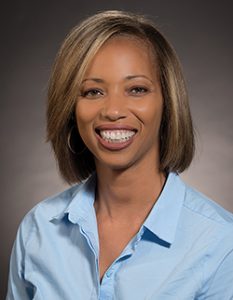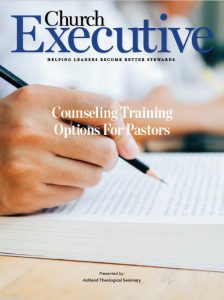
Overall, are pastors are adequately prepared to provide counseling to their church members?
Yvonne N. Glass, Ph.D., LPCC-S: It depends. Pastors are prepared for pastoral counseling. Some are certainly well-equipped to deal with parishioners’ spiritual and emotional issues. Many more are reasonably equipped to do “non-clinical” counseling, such as grief and pre-marital counseling.
They likely aren’t prepared for clinical counseling, however. Many of the concerns congregants bring to them are clinical: depression, anxiety, bipolar disorder, and so on. Sometimes the severity of the mental illness isn’t identified due to lack of training.
As a result, most pastors would do well to develop their referral skills and resources.

Director, Clinical Mental Health Counseling Programs
Ashland Theological Seminary
What are some common shortfalls, or gaps, in pastors’ ability to provide counseling?
Dr. Glass: The typical M.A. or M.Div. degree includes only a few courses in pastoral counseling. As such, it’s not possible for all, or even most, pastors to be adequately equipped to deal with the full range of mental and emotional difficulties that might present among individuals in their congregations. To be absolutely fair, very few physicians would be so equipped. That’s why more specialized training is needed in this day and age.
Of course, counseling church members must pose liabilities and risks, right?
Dr. Glass: There are liabilities. Pastors are mandated reporters of suspected abuse, as are all ordained members of the church. Pastors often miss the signs of dangerous behaviors and situations, due to lack of training. Especially critical is a pastor’s ability to notice suicidal signs and to take effective steps to prevent tragedies in those cases. Depending on the training they have, pastors might not notice or be able to assess the behaviors and situations that call for strategic intervention.
Pastors and the congregation also need to be sure their churches carry sufficient liability insurance for any lawsuits that could arise.
In recent years, which areas of counseling training have pastors sought most?
Dr. Glass: So-called “addictions tracks” in counseling have seen an enormous increase in demand due to the opioid epidemic and other addictions. The stressors and impact of these issues upon our communities, including our churches, far exceeds the media reports.
More and more pastors are electing to develop a strong referral network and to only see parishioners for one or two sessions to help them transition to a counseling professional.
Additionally, mood disorders, stress / anxiety, and marriage and family issues are always present in our culture.
What types of counseling training do you anticipate pastors will need more of in coming years?

Dr. Glass: The growing issues of addictions and concerns associated with gender identity loom large.
Are there special designations or certifications in counseling available to church leaders?
Dr. Glass: For those who have the time, calling and inclination, pastors can complete degrees that lead to licensure in clinical mental health counseling. Most are best served by resources (seminars, books) that help them identify problems and how to make good referrals.
Some churches also hire professional counselors as part of their staff.
Some congregations might join with others to form a consortium of services and skills from the community.
How have Ashland Theological Seminary’s educational / training offerings evolved in the past several years?
Dr. Glass: Our counseling program models attract church leaders primarily through scheduling that allows for classes to be completed one day a week. We’ve also developed seminar models which help pastors better understand and identify the needs which present in their congregations.
Even with this adaptation to the busy schedules of our pastors and students, our programs meet and surpass the rigorous CACREP accreditation standards, and our students pass the state licensing requirements at a 96-percent rate on their first try, making us the No. 1 program in Ohio in that regard. Finally, we seek to help the general community and parishioners understand how they might be involved in helping and serving.
If a church leader is interested in obtaining counseling training (while maintaining his or her ministry at home), is that an option?
Dr. Glass: Yes, most certainly. We seek to assist church leaders to discern exactly the best path based upon their own calling and ability to devote their time to the effort.
Of course, cost is also a consideration. In what ways can a pastor make counseling training more financially manageable?
Dr. Glass: Scholarships are available. Churches have also sponsored students with a contract for service. If churches are aware of the needs within their congregations, they might be willing to support a pastor’s additional training or that of other staff members. This might be all the truer if congregations join together to assess their community and congregational needs and resolve to act in unison.
If a pastor still thinks counseling training is out of reach, what would you say?
Dr. Glass: Living out one’s calling is challenging for anyone. But if called, God will provide. Our program offers a unique pathway that makes completion of the degree not only feasible but provides flexibility and support throughout the entire process. The program requires significant time, but the significant training is priceless.
If there’s a need in their area / congregation (especially in underserved regions) and they feel called, there’s always a way to complete the training. We’re always very happy to help an individual, a congregation, or a consortium of congregations / pastors discern what’s best for them, their congregations, and their communities.
— Reporting by RaeAnn Slaybaugh



I appreciate the honest and sincere answers. I believe this a great start to begin a paradigm shift in how pastors and the church addresses mental health.